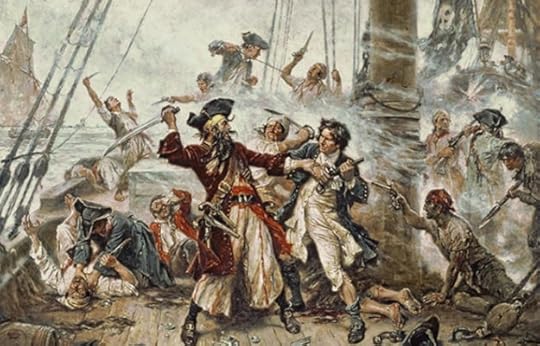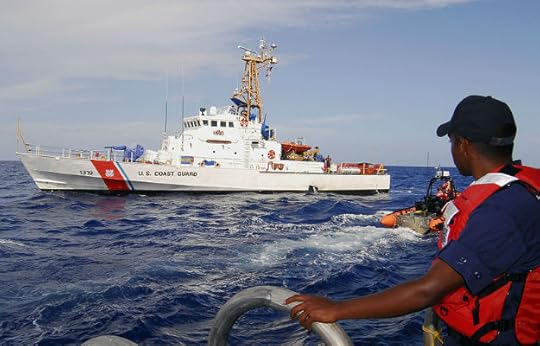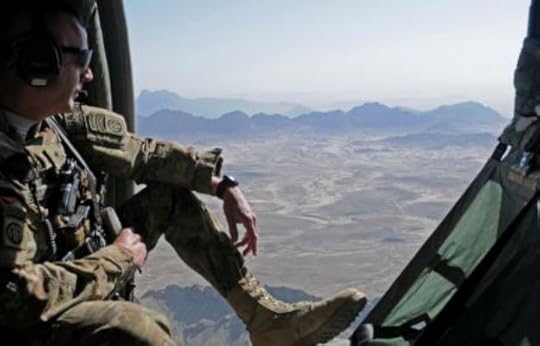Thomas E. Ricks's Blog, page 183
May 17, 2012
Don't fence me in: Gates explains why the president might not want a Pentagon chief all cozy with the Secretary of State

From a recent talk
by former Defense Secretary Robert Gates. I wonder if you have to be an old
Sovietologist to think like this:
Now here's the other side of that coin. And it's something that folks don't often
think about. The truth of the matter is that if you're the president of the
United States, you may not want a secretary of State and a secretary of Defense
to get along famously, and who are on exactly the same page, because if you've
got Defense and State on different sides of an issue, then the president is in
the position of kind of the Chinese menu. He can take a little from column A
and a little from column B.
But if the two of them are on exactly the same page, it's
not a trivial matter for the president to ignore the recommendations of both
the secretary of State and the secretary of Defense.
(HT to KP)
David Ignatius' epitaph for Pakistan

Longtime grasshoppers know I am a big fan of the commentary
of David Ignatius. So, no surprise, I think he is right in his comments
on how Pakistan has blown it over the last decade:
Pakistan is losing the best chance in its history to gain
political control over all of its territory -- including the warlike tribal
areas along the frontier.
Pakistan has squandered the opportunity presented by having a
large U.S.-led army just over the border in Afghanistan. Rather than work with
the United States to stabilize a lawless sanctuary full of warlords and
terrorists, the Pakistanis decided to play games with these outlaw groups. As a
result, Pakistan and its neighbors will be less secure, probably for decades. .
. . The
Pakistanis lost a chance over the past decade to build and secure their
country. It won't come back again in this form. That's a small problem for the
United States and its allies, but a big problem for Pakistan.
CGSC prof: PME not as bad as you feared -- but still not as valued as you may wish

By John Kuehn
Best Defense guest respondent
Tom asked me to write this as an "insider's view" of someone
who has taught students (and been a student) in the professional military
education (PME) system of the United States since 1996. Since then, I have spent 12 years teaching.
There is much discussion these days that PME is a mess, in
part because of the post-9/11 wars, and in part because of more deep seated
institutional problems. Tom,
Bob
Scales, and others
have directed
the attention of the public (and some military leaders) to the system in place
today. As a professor of history at the
Army's Command and General Staff College
(CGSC) in Fort Leavenworth, Kansas, my informed take is that PME is not
as bad as some people think, especially in regards to its faculty. On the other hand, it is not as valued by
policy makers, either those in uniform or civilians, as
one would wish -- and it is especially denigrated by those folks in the Pentagon who work for
the Office of the Secretary of Defense (OSD) and the Joint Staff, or in joint
lingo, the J-staff.
Let me start with the bad news first. Former Congressman Ike Skelton, the patron saint and founder
of the modern PME system -- as it was reformed and institutionalized in the
Goldwater-Nichols Act -- must be appalled at how his vision for PME
is being undermined.
The real problem facing us has to do with revisions to the Officer
Professional Military Education Programs instruction and policy (I'm referring here to the OPMEP, CJCS 1800 series. I understand the Joint
Staff has some kooky notion about changing the 4-1 student to faculty ration to
5-1 in the OPMEP. 4-1 right now works
out to about 15 students to one instructor in the classroom because of all the "non-teaching
or barely teaching" staff that get counted as faculty or partial faculty.
This ain't right. The move toward 5-1
must be killed -- it goes in the other direction from the best graduate education
practices for resident education. Our
problems, no matter what the quality of the faculty, will increase
substantially. Additionally, the J-staff
continues prevaricate about assigning key JDAL billets to joint faculty at the
PME schools, to include the active duty officers of other services -- for example
navy officers assigned as faculty at CGSC. Joint education will never be properly valued if a joint tour in a PME
billet is not valuable enough to be coded that way.
It has been stated that, "The [PME] faculties are too
often weak and superficial." The good news is that this is very far from the truth when it comes to teaching faculty (faculty whose primary
job involves classroom instruction). I can speak directly to the issue of the
faculty at CGSC and SAMS, which is as strong as I have seen it in my sixteen
years of association with CGSC. One problem is an out of control curriculum
that the faculty, oddly, have little control over their own delivery and content. It is a large faculty,
so that does mean that the quality varies, but CGSC's history department, for
example, is probably the most talented military history department in the PME
Diaspora (despite including me), and maybe even in the world. I know Naval War
College's faculty less well (although I lecture on occasion for their Fleet
Seminar Program). Naval War College, I think we can agree, has a first rate
faculty, despite the fact that the Navy seems to value PME
the least. This is a fascinating paradox.
If I were king, CGSC would
go back to its pre-9/11 days "legacy structure" of one term of required
primarily Army-focused, in-class content for a core course and resume its
lengthier two elective terms model for the last five months of
instruction. Overall, for the entire PME
system I would also create a tenure track for all Ph.D. faculty. For active
duty faculty I would institute competitive selection with the heads of the
various colleges, with the Commandant at Fort Leavenworth having the "right of
refusal" for sister service faculty who were not of the best quality.
Records would be screened before nominations were made. Until we value the
faculty at these institutions, how can we possibly value their product? Resident course attendance would
be a universally competitive process so that we avoid what I like to call "the no major
left behind" syndrome. But resident
attendance should never be a year off, "a sabbatical from a grateful nation," as
a colleague of mine terms it. It should be rigorous and those who attend must
be professional in understanding this is not a gift, but an opportunity for
them to better serve their country by developing their intellect.
John T. Kuehn has
taught military history at CGSC since 2003 and retired from the Navy as a commander
in 2004. He earned his Ph.D. in history
from Kansas State University in 2007. He
graduated with distinction from Naval Postgraduate School in 1988. He won the Society of Military History
Moncado Prize in 2010 and is the author of
Agents
of Innovation
(2008),
Eyewitness
Pacific Theater
(with D.M. Giangreco,
2008), and numerous articles and editorials.
May 16, 2012
Tom's World War I binge continues: A few lines from the play 'Journey’s End'

Reading Six
Weeks persuaded me to buy R.C. Sherriff's play Journey's
End, which I'd never read. I liked it especially because it is unique
to the circumstances of its war-British class differences, trench warfare, losses
by years of attrition. The entire thing takes place in an underground bunker. I
doubt that it could be "updated," for example, into a drama about the Vietnam
War. The concerns, the histories, the values of the soldiers involved are just
too different. I suspect that when it came out it was a shocker, but now it
seems like half the war movies we've seen since.
Lines I liked:
Osborne: "Where do the men sleep?"
Hardy: "I don't know. The sergeant-major sees to that."
--
Osborne: "It rather reminds you of bear-baiting -- or
cock-fighting -- to sit and watch a boy drink himself unconscious."
--
Osborne: "We are, generally, just waiting for something to
happen. When anything happens, it happens quickly. Then we just start waiting
again."
--
Stanhope: "There's not a man left who was here when I came."
(I suspect he kind of means himself, too -- he is physically present, but
spiritually with his dead comrades of the previous four years.)
William Faulkner gets his third star, let's hope he buys a round for the room tonight

Faulkner, the writer of Mississippi, famously said that the
past isn't dead, it is not even past. Turns out he was more right than he knew:
He is still with us, and just got
promoted by the Marines to lieutenant general. Maybe he can hang out with my
favorite U.S. admiral, Julius Caesar. If you think I am joking, click on
that last link.
I don't know General Faulkner, but I have met John Toolan,
whom I interviewed when I was writing 'Fiasco.' I was impressed to see him
promoted as well, to CG IMEF. He is exactly the kind of sober, tough leader
you'd like to see leading your son or daughter in combat. I can remember almost
word-for-word his comments on fighting in Fallujah.
Law of the Sea: Less boring than you think

By Will Rogers
Best Defense bureau of natural security
Washington is gearing up for another fight over the Law of
the Sea Convention (LOSC) as the U.S. Senate Foreign Relations Committee
prepares to hold hearings in the coming weeks. But while the thirty year LOSC
debate may start to sound like a broken record to some, the stakes of not
ratifying the convention are the highest they have ever been for the United
States.
Although the United States has safeguarded its interests at
sea by relying on customary international law, this approach is becoming
increasingly risky. Critics of LOSC routinely argue that the convention's most
important provisions -- including maritime navigational rights -- are already
accepted international norms, recognized by other countries as the rules of the
road at sea. However, critics fail to appreciate that customary international
law can change, as it appears to be doing today.
Rising maritime powers across the globe are reinterpreting
customary international law to promote their own national interests -- including
in ways that may conflict with longstanding maritime norms and American
interests. Nowhere is this more apparent than in the South China Sea, where
China's outsized claim to the entire region flies in the face of both
traditional practices and LOSC. But China is not the only offender. Burma,
Thailand, and others are joining China in more restrictive interpretations of
maritime navigational rights, including anti-access norms that could constrain
the U.S. Navy's ease of access in this crucial maritime domain.
Unfortunately, the United States is not in a position to
rebuff these restrictive interpretations and protect the maritime norms that
have been so beneficial to the global economy and U.S. security. U.S. failure
to ratify the treaty has prevented the United States from taking a seat at the
table to avail itself of the convention's established legal frameworks, such as
the Law of the Sea Tribunal. And while the United States sits on the sidelines,
other countries are engaging in discussions of maritime law, and in some places
working toward consensus on issues that could have consequences for the United
States for decades. Joining the treaty will allow the United States to lead
these important discussions and, more importantly, enable the United States to
negotiate with countries from a position of strength to protect the customary
practices codified by the convention.
Ratifying LOSC will also strengthen a range of ongoing U.S.
security activities. The U.S. Navy and U.S. Coast Guard are our key instruments
of power at sea and ratifying LOSC will strengthen their ability to do their
job and work with others to protect U.S. interests, including areas such as
counter proliferation and counter piracy. More importantly, ratifying the
convention would give the U.S. Navy and Coast Guard the strongest legal footing
for their actions, including in places like the Strait of Hormuz, where Iran
has threatened to close access to the international passageway in direct
violation of the convention. As Chairman of the Joint Chiefs of Staff General
Martin Dempsey recently said, "It
validates the operations we conduct today and realizes our vision for a secure
future."
For some, the most pressing reason to ratify LOSC is to
acquire legal jurisdiction to the estimated trillion
dollars of energy and mineral resources on the extended continental shelf,
an area beyond the recognized 200-nautical mile Exclusive Economic Zone (EEZ).
Ratifying the treaty will allow the United States to submit a claim to the U.N.
Commission on the Limits of the Continental Shelf, expanding U.S. sovereignty
to critical energy and mineral resources on the extended continental shelf. "Not since we
acquired the lands of the American west and Alaska have we had such an
opportunity to expand U.S. sovereignty," Secretary of Defense Leon Panetta
recently said.
To date, many U.S. companies have been reluctant to operate
beyond the U.S. EEZ due to the lack of U.S or international legal protections that
significantly raise the risks for companies operating beyond any national
jurisdiction. Securing sovereign rights to the extended continental shelf will
provide U.S. businesses the recognized title and protection to resources
there, expanding domestic production of oil and natural gas, strengthening our assured
access to energy resources. What is more, U.S. businesses would be able to lay
claim to mineral resources, including rare earth metals that are critical to
defense technologies, helping to reduce risky U.S. reliance on Chinese rare
earths by bolstering U.S. domestic production.
Ratifying LOSC will not address every challenge the United
States will confront at sea, but it will substantially improve America's
ability to protect its global interests by providing a stronger legal
foundation for its own maritime activities and helping to shape and enforce
international norms and legal authorities. Most importantly, it will restore
U.S leadership at sea. The United States has always been a maritime power.
Given the growing importance of the maritime domain to U.S. interests and the
rapidly changing global security environment, the United States needs every
tool at its disposal to ensure that America will remain a strong global leader
at sea.
The U.S. Senate should ratify the Law of the Sea Convention
today.
Will Rogers is a research associate at
the Center for a New American Security, a
non-partisan national security and defense policy think tank in Washington. He
is the author of Security at
Sea: The Case for Ratifying the Law of the Sea Convention.
May 15, 2012
The cadre: Thinking outside the box about how rotation affects operations
By
Andrew Person
Best
Defense department of personnel-as-policy affairs
After
over a decade spent fighting in Afghanistan, American officers are still having
their first cups of tea with key Afghan leaders in government, tribes, and
villages. As I argue in a piece I wrote for the Small Wars Journal titled "Getting Past the First Cup of Tea" (available on page 10 at this link), the Lazy Susan
style rotation of American leadership in Afghanistan makes our mission
impossible.
What
would an alternative model look like? If the U.S. had established a
permanent cadre of military leaders on the ground in Afghanistan from the
outset, with the understanding that they would serve there for the duration of
the war, these leaders could have built the personal relationships and
knowledge required to effectively wage a counterinsurgency campaign. Viewing the past ten years of the war with 20/20 hindsight, it seems clear that
such an approach would have dramatically improved our chances of success.
A
permanent cadre of American leaders would enjoy a number of advantages over
officers serving on year-long rotations through Afghanistan. Those who have
waged counterinsurgency in Afghanistan know that every village and valley has
its own cast of characters whom it would take years to truly understand. The cadre
could come to understand this complex and foreign human terrain. To hand over
security responsibility to the Afghan government, you have to know who can be
trusted to use their power wisely and effectively. And if you're building up a
security force or constructing a road without the intimate understanding of how
such actions are impacting the human terrain, you can't really know whether
such actions are advancing or undermining your mission. This knowledge takes
years to develop, and thus most American leaders rotating on a yearly basis
have not achieved a sufficient familiarity with the human terrain to
effectively execute their mission.
It
takes trust for an Afghan to risk Taliban retribution by working with U.S.
forces -- a trust that is nearly impossible to establish over the course of a
year-long tour. Over the years, Afghan leaders could come to know and trust the
permanent cadre. A deeper relationship of trust would open up communication
between Americans and Afghans, improving intelligence sharing and helping
Americans protect Afghan villages from Taliban reprisals. Further,
Afghans would know that cheating or lying to permanent cadre could risk poisoning
a valuable relationship over the long term. As it is now, some duplicitous
Afghans have a fresh crop of Americans to tee-off on every year.
The
men and women who volunteer to serve in such a permanent cadre would by
definition be an exceptional and unusual breed. They would have few commitments
back home and could immerse themselves completely in the mission. The cadre
would develop strong language skills and not be dependent on contracted
translators. They would not worry about getting back to base to Skype with
their loved ones and wouldn't be marking time until their year-long rotation is
over. Unlike the current system, there would be no incentive to kick problems
down the road.
Now,
on to the mechanics of how the permanent leadership cadre would function. The
cadre would have a loose internal hierarchical structure with the highest
echelon reporting directly to the top military commander in Afghanistan. It
would have absolute command over military operations in Afghanistan, down to the
battalion level. No U.S. entity -- special operations and CIA included -- could
operate in the cadre's area of responsibility without its complete knowledge
and approval.
Battalions
would fall in under the cadre's command for year-long rotations. A
non-cadre garrison commander would train and equip battalions to ready them for
battle and a change of command would be carried out upon approved inspection in
Afghanistan. The cadre would have authority to hire and fire company,
platoon, and squad leadership and could send an entire battalion back to
garrison if not up to standard. Platoon and company leadership would compete
to take the limited number of cadre positions that opened up.
While
on patrol, the cadre would enjoy easy access to a variety of key combat
enablers which would demonstrate their authority to the Afghans with whom they
work. An AC-130 gunship would escort every night patrol. A-10s would
escort day patrols. The cadre would have helicopter gunships available on any
moment's notice. It would have lift at all times. If there were not
enough lift to satisfy the cadre's demand, then the U.S. commander in Afghanistan
would immediately proceed to Congress to testify that more damn helicopters are
needed in Afghanistan. These enablers are expensive but they're worth the
price. When Afghans see them, they would know that cadre members can come and
go as they please on a moment's notice, and that they can call massive fire
support to come raining in from the sky. The cadre would be the
personification of American power.
Could
America really find men and women interested in such a brutally long
assignment? By offering certain incentives we could attract a number of
military leaders for such duty. Members of the cadre would have the peace
of mind knowing they never have to command in a garrison environment and never
have to do a battalion fun run or worry about where their PT reflector belt is.
Cadre leadership could be shielded from paperwork and random one-star generals
"circulating the battlefield." The cadre could be offered generous
compensation based on this general rule of thumb: Double the pay of any general
in garrison who can't pass a PT test. A special IG for overpaid and overweight
Pentagon Generals could monitor and enforce the rule. Of course, the cadre
would be offered periodic vacations from theater to rest and recover.
The
draw of prestige and power would also attract volunteers for the cadre. It's
remarkable what young men go through to earn a ranger tab or join the Navy
SEALs. A cadre post could conceivably grow to become much more coveted by
ambitious and dedicated young leaders.
There
are countless details required to implement such a proposal that I have yet to
consider, particularly how this structure would work with an international
force. The risk of cadre leaders going off the rails Colonel
Kurtz-style must be acknowledged and mitigated. But one fact is abundantly
clear to anyone who has ever served in Afghanistan: The annual rotation of
leaders in Afghanistan is fatal to our mission. If we ever try to do this
again, we should give serious consideration to an alternative model.
J. Andrew Person served as a U.S. Army
officer and paratrooper from 2001-2006, including year-long tours in Iraq and
Afghanistan. He is now a fellow with the Truman National Security Project and
works on Capitol Hill. This essay is intended as a thoughtful piece and has
no connection to his day job.
What sort of help do Google and the National Security Agency give each other?

Something,
it looks like, but we are not going to be told about it, if a U.S. Court of
Appeals ruling
issued last Friday stands.
I
wonder if Google
and NSA will merge one day.
On
the other hand, something that discourages intelligence operatives in China
from hacking into our e-mails is probably a good thing. Hmm -- maybe I am learning how to love Big Brother?
An American story: Haitian kid rescued by Coast Guard becomes CG officer

It
does my heart good to see a
story like this: When he was six years old, at sea with his mother in a
wooden boat, Orlando Morel was rescued by the Coast Guard.
Now
he is graduating from the Coast Guard academy, and scheduled to serve on a
cutter in Florida. He is described by someone at the academy as "a phenomenal
cadet."
May 14, 2012
82nd Airborne general shipped home from Afghanistan under criminal investigation

Brig.
Gen. Jeffrey Sinclair, the 82nd Airborne's deputy commanding general
for support, has been sent
home from Afghanistan under a cloud.
"This is a criminal investigation," a
military spokesman ominously told the Fayetteville Observer.
What up with that?
It reminds me of a story a historian of the
disciplinary barracks at Fort Leavenworth once told me. Eisenhower was busting
a major general who had gotten drunk and talked about top secret stuff in a
hotel bar in London. "Don't send me to Leavenworth, Ike," the major general
supposedly said. "No general has ever done time at Leavenworth."
"No, they haven't -- colonel," responded Ike.
(This may be one of those tales too good to
check out. I read tons of WWII history over the last three years, including
lots of Ike's papers, and I never saw this exchange recounted. But it does
resemble the story of Maj. Gen. Henry Jervis Friese Miller, a senior Air
Force supply officer, who got drunk at a party at Claridge's hotel in London
and announced that the D Day invasion of France would take place by mid-June.
(See "Army and Navy: Silence is Golden,"
Time Magazine, June 191944.) After his indiscretion was reported, he
wrote to Eisenhower, a West Point classmate of his, recognizing that he would
be relieved, but asking that he be allowed to keep his rank. Eisenhower denied the request and reduced him
to his permanent rank of colonel. Miller went home and left the army a few
months later.)
Thomas E. Ricks's Blog
- Thomas E. Ricks's profile
- 436 followers



